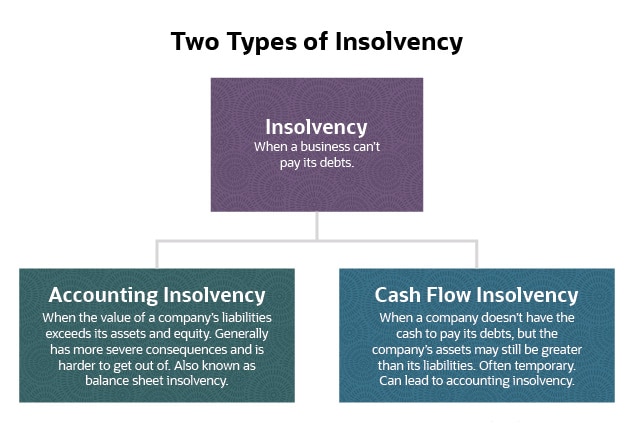3 Easy Facts About Insolvency Practitioner Shown
Wiki Article
The smart Trick of Insolvency Practitioner That Nobody is Discussing
Table of ContentsThe Buzz on Insolvency PractitionerSome Known Details About Insolvency Practitioner A Biased View of Insolvency PractitionerInsolvency Practitioner - The FactsThe Facts About Insolvency Practitioner UncoveredThings about Insolvency PractitionerHow Insolvency Practitioner can Save You Time, Stress, and Money.
Insolvency is when responsibilities are more than the worth of the firm, or when a debtor can not pay the financial obligations they owe. A business can end up being financially troubled as a result of a number of scenarios that result in inadequate money circulation. When encountered with bankruptcy, a company or individual can get in touch with financial institutions directly and restructure debts to pay them off.Service owners might call financial institutions straight and restructure financial obligations right into more convenient installments. Lenders are generally open to this method because they desire to be paid back and avoid losses, even if the payment is on a delayed schedule.
9 Simple Techniques For Insolvency Practitioner
The proprietor produces a proposal outlining just how the financial obligation may be restructured using cost decreases or various other prepare for assistance. The proposal shows lenders exactly how the business might produce adequate cash circulation for profitable operations while paying its debts. Typically, a forgiven financial debt might be considered income by the Irs (INTERNAL REVENUE SERVICE).
Some Known Incorrect Statements About Insolvency Practitioner
The company might wind up paying large quantities of money in problems and be unable to proceed procedures. When operations discontinue, so does the firm's revenue. Lack of earnings results in accounts payable and financial institutions asking for money owed to them. Some business end up being bankrupt because their items or services don't advance to fit consumers' altering needs.Costs go beyond revenues and expenses continue to be unpaid. Kinds of bankruptcy consist of cash-flow insolvency and balance-sheet insolvency. Cash-flow insolvency takes place when a company has the possessions to cover their financial obligations but they remain in the wrong form, such as realty rather than fluid funds. Balance-sheet bankruptcy, on the various other hand, suggests an absence of properties in any kind of form to cover financial obligations.
The internal revenue service states that an individual is financially troubled when the total responsibilities go beyond complete properties. A bankruptcy, on the various other hand, is an actual court order that depicts how a financially troubled individual or company will settle their lenders, or exactly how they will certainly sell their possessions in order to make the repayments.
Facts About Insolvency Practitioner Uncovered

Financial debt loan consolidation is when you incorporate several finances right into one brand-new funding, typically to accomplish better terms. Insolvency is not the like bankruptcy, although a company that has actually ended up being financially troubled might declare insolvency. Bankruptcy is the state of not being able to pay your responsibilities while insolvency is a lawful process to release your financial debts.
Comprehending the elements that can bring about bankruptcy, such as overspending, can aid you protect against insolvency and its effects.
All About Insolvency Practitioner
It is well recognized that directors and officers of firms (and managers of limited liability companies) owe fiduciary tasks to their companies and their investors (or members). These fiduciary obligations are specified by state laws and, though there are variants from state to state, they typically include a responsibility of loyalty and a responsibility of care.
The task of care requires directors and police officers to exercise diligence, to make educated decisions, and to act in good belief to ensure that their activities remain in the most effective rate of interest of the business. Past the extent of this discussion, some states allow these responsibilities to be limited either by so noting in the business papers or abiding with various other needs.
The Definitive Guide for Insolvency Practitioner
Many states specify insolvency in 2 ways( 1) when a company's obligations come to be higher than the amount of its possessions or (2) when the business becomes incapable to pay its financial debts as they end up being dueand welcome both definitions (Insolvency Practitioner). The shift in obligations occurs since when a firm is bankrupt, there is no value in the company beyond that owed to the company's lenders to ensure that the equity owners no longer have a financial stake in the firmBe cautious regarding offering shareholders favoritism at the expense of creditors (e.g., authorizing and funding a returns or a stock redemption). Beware about advantageous treatment in between courses of shareholders. Clear up initiatives to find out all the facts before taking a certain training course of action; directors ought pop over to this web-site to truly webpage think that any type of choices made are in the very best interests of the corporation in its whole (i.e., decisions will certainly be examined in hindsight due to the effect of such actions on the company).
In any kind of insolvency or insolvency proceeding, repayments made to specific lenders at the cost of various other creditors can be clawed back, specifically if there is some link between the company and the lender. Think about suggesting at a yearly stockholder conference (or any kind of other conference of investors) a resolution affirming that all previous service choices and actions taken by the supervisors and police officers of the company were taken in great belief after an exercise of practical care.
Insolvency Practitioner Fundamentals Explained
Completely divulge any kind of individual or organization partnerships with parties on the other side of deals involving the company to stay clear of the look of a dispute of interest. Learn More In assessing potential fund increasing deals or a sale of assets of the distressed company, understand that these transactions may be scrutinized later taking into account any succeeding growth of supervisors' fiduciary responsibilities to include creditors.Report this wiki page